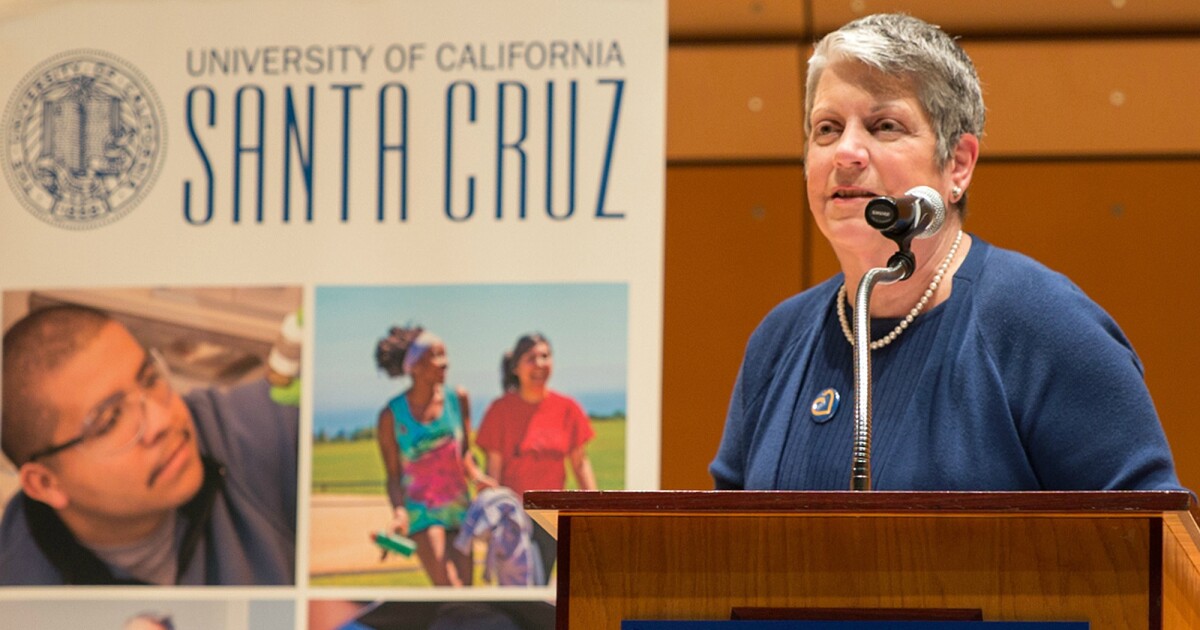MinnesotaSmith
Membership Revoked
A good example of "Higher ed doesn't work, California doesn't work, and higher ed + California REALLY doesn't work" Department.

 www.latimes.com
www.latimes.com
UC Santa Cruz fires 54 graduate student workers striking for higher pay

UC President Janet Napolitano discusses UC Santa Cruz at a 2017 event.
By SUHAUNA HUSSAINSTAFF
FEB. 28, 2020
UC Santa Cruz fired 54 graduate student workers who were on strike demanding higher pay to afford the area’s high cost of living.
As part of a “wildcat strike,” about 200 teaching assistants decided in December to withhold fall quarter grades after months of back and forth with campus administrators. They demanded an increase in pay of $1,412 a month. The strike is not backed by the union that represents the university’s graduate student employees.
Tension between student workers, the campus and University of California administrators heightened dramatically in recent weeks as talks floundered. Students escalated the grade strike in early February to a full work stoppage, declining to teach, hold office hours, conduct research or post grades. Seventeen students were arrested at a campus protest Feb. 12, and UC Santa Cruz and the UC president published a series of letters online over the last month warning student workers they would be disciplined if they failed to submit grades.
On Monday, UC Santa Cruz told teaching assistants it would check for the withheld grades later in the week. The campus sent letters of intent to dismiss Friday around noon to 54 students. An estimated 30 other students who had yet to secure spring teaching jobs were told they would not be eligible for the positions, student activists said.
Housing is expensive in Santa Cruz, and student workers have a difficult time living on the typical stipend of $2,400 a month before taxes, said Veronica Hamilton, vice president of UC Santa Cruz’s graduate student association and chair of the campus’ unit of UAW Local 2865, the union for more than 19,000 student workers at the UC system.
The cost-of-living-adjustment movement has spread to other UC campuses.
UC Santa Barbara graduate students voted Monday for a full strike, and UC Davis students decided Thursday to withhold student grades for the winter quarter until the university raises their housing supplement. Students from across the 10-campus UC system have held rallies in support of student workers at UC Santa Cruz.
UC Santa Cruz spokesman Scott Hernandez-Jason said in a statement that 96% of grades were submitted and the “vast majority” of graduate students have returned to work, but 54 students continued to “disrupt campus by withholding grades for undergraduate students in a way that unfairly impairs their education.”
Among those fired Friday was Brenda Arjona, a third-year doctoral student in anthropology who has a 10-year-old son and lives in student family housing. She’s still trying to figure out what being fired will mean for her status as a student. [On her Facebook or Twitter or something she's proudly unmarried, with no kid's dad around.]
As a teaching assistant, she doesn’t pay tuition, and Arjona said there’s no way she can pay thousands of dollars of tuition out of pocket, so she may have to withdraw or take a leave of absence from the school.
“I’m struggling for basic needs such as toilet paper, buying my son milk,” said Arjona, who pays about $1,700 a month in rent out of the $2,200 she receives after taxes. “If there’s an emergency, I have truly nothing to fall back on.”
She had known losing her job was a possibility but wanted to keep pushing on with the strike. “I should not have to live this way,” Arjona said.
Hernandez-Jason said UC Santa Cruz’s administration has worked to hear and address teaching assistants’ concerns.
“UCSC leadership is well aware of the housing crisis in Santa Cruz and has made numerous good faith efforts to offer solutions and assist our TAs,” Hernandez-Jason said in an email.
Those efforts include an annual $2,500 housing supplement until more campus housing becomes available for graduate students and two temporary housing assistance programs for graduate students. The campus’ chancellor also announced a joint working group to develop “appropriate and sustainable” graduate student support, Hernandez-Jason said.
Hamilton said the $2,500 supplement offered by the university after negotiations this year provides students with only an extra $200 a month, which does not do much to fix the problem. She said students shouldn’t have to relinquish their only leverage for the university to come to the table.
“They shouldn’t fire anybody,” said Hamilton, who is a graduate student teaching assistant but was not among those fired. She pays $1,800 a month to live a 40-minute drive away from campus in a cabin with no heat. “People are telling them they’re homeless, and they won’t have a substantive conversation.”
The UC system’s four-year contract with the union, which expires in 2022, includes “fair pay and excellent benefits,” UC spokesman Andrew Gordon said in a statement.
“Reopening the contract would defeat the purpose of a signed agreement and would be unfair to all the other UC unions as well as nearly 90,000 represented employees at the University who do adhere to collective bargaining agreements,” he said.
Hamilton said that the contract’s terms were inadequate and that although it was ratified UC-wide, 83% of student employees at UC Santa Cruz voted against it at the time.
On Feb. 14, the campus’ provost sent an message saying that the student workers participating in the grading strike had until Feb. 21 to submit missing grades and that those who did not would not receive spring quarter jobs as teaching assistants, or would be dismissed from their spring quarter appointments.
On the same day, UC President Janet Napolitano sent a letter addressed to faculty, staff and students saying teaching assistants would be fired if they continued to withhold grades.
“Holding undergraduate grades hostage and refusing to carry out contracted teaching responsibilities is the wrong way to go. Therefore, participation in the wildcat strike will have consequences, up to and including the termination of existing employment at the University,” Napolitano wrote. “We urge the striking TAs to turn in their grades and return to the classroom.”
The UC system filed an unfair-labor-practice charge against UAW 2865 on Tuesday alleging the union failed to take the steps required by the collective bargaining agreement to stop the strike by teaching assistants at UC Santa Cruz.
In response, UAW 2865 filed its own unfair-labor-practice charge Thursday against the UC system alleging that it refused to meet with the union to negotiate a cost of living adjustment that has been the focus of actions across the state and the wildcat strike at UC Santa Cruz.
“I’m staying optimistic that we can continue to galvanize people on other campuses and spread this movement,” Arjona said."

UC Santa Cruz fires 54 graduate student workers striking for higher pay
UC Santa Cruz has fired 54 teaching assistants who withheld grades from the university as part of a "wildcat strike" demanding higher pay to afford the cost of living.
UC Santa Cruz fires 54 graduate student workers striking for higher pay

UC President Janet Napolitano discusses UC Santa Cruz at a 2017 event.
By SUHAUNA HUSSAINSTAFF
FEB. 28, 2020
UC Santa Cruz fired 54 graduate student workers who were on strike demanding higher pay to afford the area’s high cost of living.
As part of a “wildcat strike,” about 200 teaching assistants decided in December to withhold fall quarter grades after months of back and forth with campus administrators. They demanded an increase in pay of $1,412 a month. The strike is not backed by the union that represents the university’s graduate student employees.
Tension between student workers, the campus and University of California administrators heightened dramatically in recent weeks as talks floundered. Students escalated the grade strike in early February to a full work stoppage, declining to teach, hold office hours, conduct research or post grades. Seventeen students were arrested at a campus protest Feb. 12, and UC Santa Cruz and the UC president published a series of letters online over the last month warning student workers they would be disciplined if they failed to submit grades.
On Monday, UC Santa Cruz told teaching assistants it would check for the withheld grades later in the week. The campus sent letters of intent to dismiss Friday around noon to 54 students. An estimated 30 other students who had yet to secure spring teaching jobs were told they would not be eligible for the positions, student activists said.
Housing is expensive in Santa Cruz, and student workers have a difficult time living on the typical stipend of $2,400 a month before taxes, said Veronica Hamilton, vice president of UC Santa Cruz’s graduate student association and chair of the campus’ unit of UAW Local 2865, the union for more than 19,000 student workers at the UC system.
The cost-of-living-adjustment movement has spread to other UC campuses.
UC Santa Barbara graduate students voted Monday for a full strike, and UC Davis students decided Thursday to withhold student grades for the winter quarter until the university raises their housing supplement. Students from across the 10-campus UC system have held rallies in support of student workers at UC Santa Cruz.
UC Santa Cruz spokesman Scott Hernandez-Jason said in a statement that 96% of grades were submitted and the “vast majority” of graduate students have returned to work, but 54 students continued to “disrupt campus by withholding grades for undergraduate students in a way that unfairly impairs their education.”
Among those fired Friday was Brenda Arjona, a third-year doctoral student in anthropology who has a 10-year-old son and lives in student family housing. She’s still trying to figure out what being fired will mean for her status as a student. [On her Facebook or Twitter or something she's proudly unmarried, with no kid's dad around.]
As a teaching assistant, she doesn’t pay tuition, and Arjona said there’s no way she can pay thousands of dollars of tuition out of pocket, so she may have to withdraw or take a leave of absence from the school.
“I’m struggling for basic needs such as toilet paper, buying my son milk,” said Arjona, who pays about $1,700 a month in rent out of the $2,200 she receives after taxes. “If there’s an emergency, I have truly nothing to fall back on.”
She had known losing her job was a possibility but wanted to keep pushing on with the strike. “I should not have to live this way,” Arjona said.
Hernandez-Jason said UC Santa Cruz’s administration has worked to hear and address teaching assistants’ concerns.
“UCSC leadership is well aware of the housing crisis in Santa Cruz and has made numerous good faith efforts to offer solutions and assist our TAs,” Hernandez-Jason said in an email.
Those efforts include an annual $2,500 housing supplement until more campus housing becomes available for graduate students and two temporary housing assistance programs for graduate students. The campus’ chancellor also announced a joint working group to develop “appropriate and sustainable” graduate student support, Hernandez-Jason said.
Hamilton said the $2,500 supplement offered by the university after negotiations this year provides students with only an extra $200 a month, which does not do much to fix the problem. She said students shouldn’t have to relinquish their only leverage for the university to come to the table.
“They shouldn’t fire anybody,” said Hamilton, who is a graduate student teaching assistant but was not among those fired. She pays $1,800 a month to live a 40-minute drive away from campus in a cabin with no heat. “People are telling them they’re homeless, and they won’t have a substantive conversation.”
The UC system’s four-year contract with the union, which expires in 2022, includes “fair pay and excellent benefits,” UC spokesman Andrew Gordon said in a statement.
“Reopening the contract would defeat the purpose of a signed agreement and would be unfair to all the other UC unions as well as nearly 90,000 represented employees at the University who do adhere to collective bargaining agreements,” he said.
Hamilton said that the contract’s terms were inadequate and that although it was ratified UC-wide, 83% of student employees at UC Santa Cruz voted against it at the time.
On Feb. 14, the campus’ provost sent an message saying that the student workers participating in the grading strike had until Feb. 21 to submit missing grades and that those who did not would not receive spring quarter jobs as teaching assistants, or would be dismissed from their spring quarter appointments.
On the same day, UC President Janet Napolitano sent a letter addressed to faculty, staff and students saying teaching assistants would be fired if they continued to withhold grades.
“Holding undergraduate grades hostage and refusing to carry out contracted teaching responsibilities is the wrong way to go. Therefore, participation in the wildcat strike will have consequences, up to and including the termination of existing employment at the University,” Napolitano wrote. “We urge the striking TAs to turn in their grades and return to the classroom.”
The UC system filed an unfair-labor-practice charge against UAW 2865 on Tuesday alleging the union failed to take the steps required by the collective bargaining agreement to stop the strike by teaching assistants at UC Santa Cruz.
In response, UAW 2865 filed its own unfair-labor-practice charge Thursday against the UC system alleging that it refused to meet with the union to negotiate a cost of living adjustment that has been the focus of actions across the state and the wildcat strike at UC Santa Cruz.
“I’m staying optimistic that we can continue to galvanize people on other campuses and spread this movement,” Arjona said."
Last edited:





